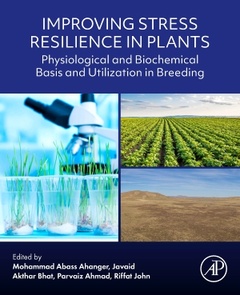Improving Stress Resilience in Plants Physiological and Biochemical Basis and Utilization in Breeding
Coordonnateurs : Abass Ahanger Mohammad, Bhat Javaid Akthar, Ahmad Parvaiz, John Riffat

Improving Stress Resilience in Plants: Physiological and Biochemical Basis and Utilization in Breeding addresses the urgent need for improved understanding of major plant stress tolerance mechanisms, the identification of the genes, and gene products that are key to improving those mechanisms and means of optimizing those genes through molecular approaches. With a focus on plant physiological and biochemical attributes at both cellular and whole plant levels, this book includes the latest information on crosstalk between the various signaling molecules and quantitative trait locus (QTL). Further, it explores the extension of these mechanisms to breeding approaches, confirming overall understanding and inspiring further research. Written by a team of global experts, and presented in three thematic sections, the book provides insights into physical adaptations, metabolism and pathways, and breeding techniques including CRISPR and conventional approaches to reduce the negative effects of stresses and improve crop yield even under stress conditions. It is an ideal resource for researchers, academics and advanced students seeking to improve stress tolerance among crop plants and developing key future strategies for sustainable food production.
1. Physiological adaptation of plants to abiotic stresses
2. Modulation of physiology in plants through osmolytes application
3. Studying the physiology of genetically modified crop plants
4. Root traits and water relations in plants under stresses
5. Role of soil microbes in modulating the physiological attributes of plants under extreme environmental conditions
6. Morphological modulations in plants exposed to abiotic and biotic stresses
7. Physiological modulations/ adaptations of plants for improved mineral nutrition under stresses
8. Regulation of photosynthesis under stress
9. Water relation, photosynthesis and plant growth
10. Modification of physiological attributes by nano-fertilizes attributes for improved stress tolerance
11. Physiological modification in plants under fungicide and pesticide stress
Biochemistry
12. Modulation of plant biochemistry through excess use of fungicides and herbicides in plants
13. Enzyme functioning and environmental stresses
14. Plant nitrogen metabolism: effects of stresses and the mitigating role of mineral elements and phytohormones
15. Plant nitrogen metabolism: effects of stresses and the mitigating role of compatible osmolytes
16. Modulation of sulphur metabolism in plants under stress conditions: role of mineral elements
17. Sulphur metabolism and phytohormones interactions in plants under stress
18. Antioxidant system: role and regulation under environmental stresses vis-à-vis mineral nutrition
19. Understanding the role of plant growth regulators as key players in stress signalling
20. Role of phytohormones in improving stress tolerance: Focus on the antioxidant system
21. Understanding the role of thiols in stress biology of crop plants
22. Ascorbate-Glutathione Pathway: abiotic stress tolerance in plants and modulations by exogenous osmo-protectants
23. Photosynthesis: role of antioxidant system and glyoxylase system
24. Reactive oxygen species production: production. Signalling, and antioxidant and glyoxylase defence systems
25. Understanding the biochemical basis of stress signalling in plants
26. Breeding and Plant Stress Tolerance
27. Integrated approaches of "omics" for the improvement of stress tolerance in plants
28. Understanding the regulatory mechanisms of abiotic stress tolerance in plants by using genomic approaches
29. Prognosis for genetic improvement of yield potential of major grain crops under environmental stress
30. Genotypic variation for stress tolerance in legume crops
31. Genomics-assisted breeding for the development of stress tolerant crop varieties
32. Marker assisted selection in plant breeding for stress tolerance
33. Recent advances in plant breeding for the improvement of plant stress tolerance: Prospects and limitations
34. QTLs for stress tolerance in plants
35. CRISPR gene editing and stress tolerance
36. Genetic approaches for tolerance to multiple stresses
Dr Bhat is an Associate Professor, International Genome Centre, Jiangsu University, China. He also worked as Postdoctoral Fellow at State Key Laboratory for Crop Genetics and Germplasm Enhancement, Nanjing Agricultural University (June-2018 to November-2021). Dr. Bhat is recipient of Research Associateship at Council of Scientific and Industrial Research, Human Resource Development Group, CSIR Complex, PUSA, New Delhi in 2017 (2016-2018). He is mainly engaged in Plant Genetics, Molecular Breeding, Functional and Applied Genomics, and Computational Biology; In addition, he is engaged in Plant Stress Physiology, Signalling and Genetics particularly for the case of abiotic stresses including heavy metals/metalloids. He has published more than 80 papers in many well reputed SCI Journals serves as editor/Associate e
- Explores key strategies, including signaling molecules and Quantitative Trait Locus (QTLs)
- Highlights stress mitigating agents for improved crop yield
- Provides an integrated and holistic overview, enabling and inspiring further research toward improved food security
Date de parution : 11-2023
Ouvrage de 504 p.
19x23.4 cm



